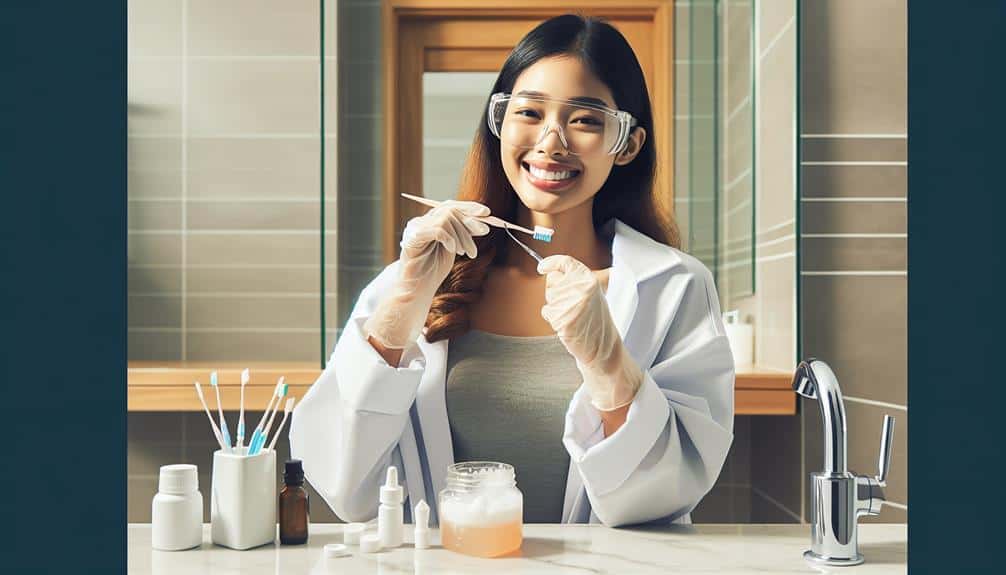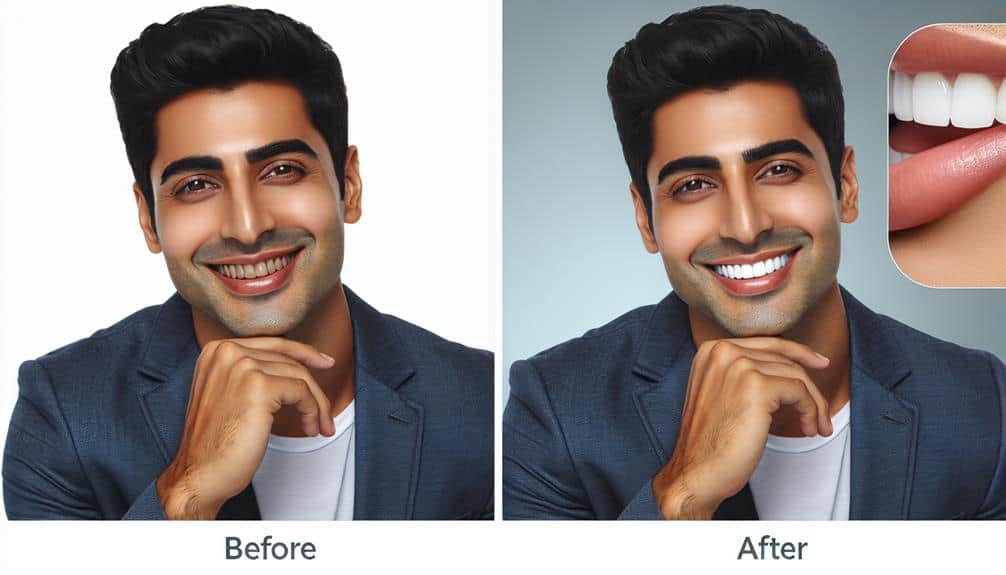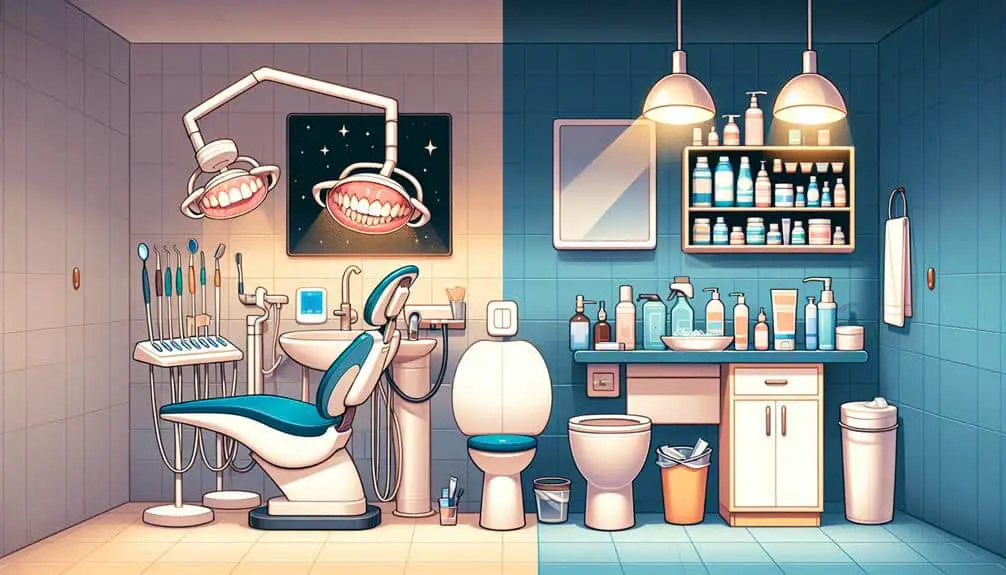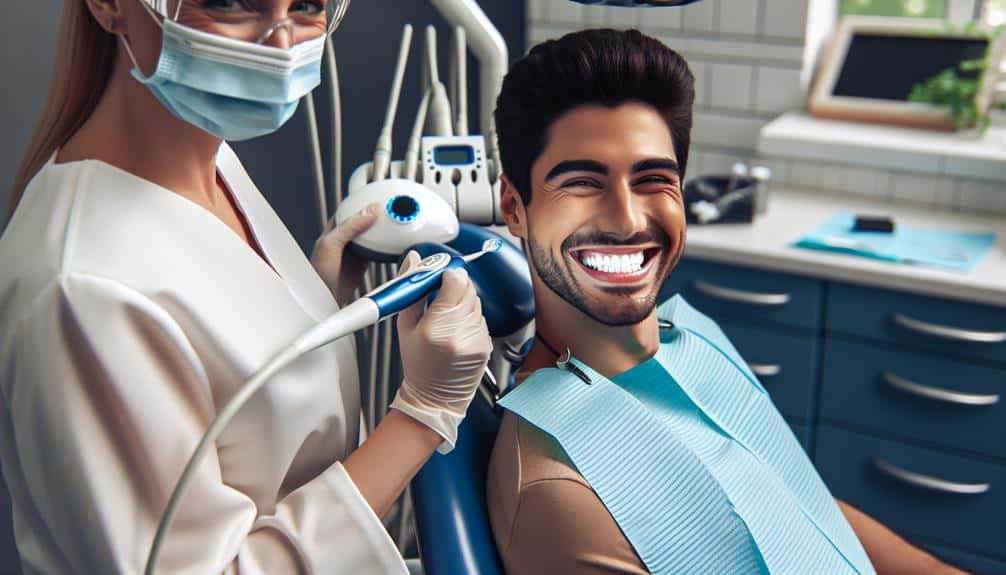Guarantee the safety of your teeth when whitening at home by recognizing the risks associated with DIY methods and by seeking advice from a dentist before starting. Using strong or acidic substances on your teeth can harm the enamel, leading to sensitivity and decay, while excessive use of products can also damage your enamel. Giving importance to a dental consultation is vital for a safe whitening experience. Understanding the risks and benefits can help steer you towards a brighter smile.
Key Points
- Consult a dentist before starting DIY whitening for personalized advice.
- Use a designated whitening tray to prevent gum irritation and ensure even application.
- Apply whitening product sparingly to avoid gum contact and potential sensitivity.
- Follow recommended duration and discontinue if discomfort occurs during whitening.
- Essential to read and follow product labels for safe and effective at-home whitening.
Risks of DIY Teeth Whitening
When attempting DIY teeth whitening, it's important to be aware of the potential dangers involved to make an informed decision about your oral health. One of the primary risks of DIY teeth whitening is enamel damage. Enamel is the outer layer of your teeth that protects them from decay and damage. Using harsh or acidic substances in DIY whitening kits can wear down this protective layer, leading to increased sensitivity, discoloration, and even decay over time.
Enamel damage is irreversible, so it's vital to be cautious when whitening your teeth at home. Some DIY methods, such as using baking soda or lemon juice, can be abrasive and erode the enamel. Additionally, overusing whitening products or leaving them on for too long can also harm the enamel. It's crucial to follow instructions carefully and not exceed the recommended usage to prevent enamel damage and other oral health issues. Always consult with a dentist before starting any whitening treatment to make sure it's safe for your teeth.
Benefits of Professional Whitening
For ideal results and safety, consider the advantages of professional whitening treatments administered by trained dental professionals. Professional whitening offers immediate results, often achieving several shades of improvement in a single session. This quick transformation is appealing for those seeking a fast enhancement to their smile for special occasions or events.
While the upfront cost of professional whitening may seem higher than DIY methods, in the long run, it can be more cost-effective. Professional treatments are tailored to your specific needs, ensuring best results without the risk of overusing products or causing damage to your teeth and gums. Dental professionals have the expertise to assess your dental health before proceeding with whitening treatments, minimizing the chances of adverse effects.
Additionally, professional whitening treatments often use higher quality, more potent whitening agents that aren't available for at-home use, leading to more effective and longer-lasting results. Opting for professional whitening can provide you with a safe, efficient, and superior teeth whitening experience.
Safety Tips for At-Home Whitening
Consider these essential safety tips for effective at-home teeth whitening.
When starting on at-home whitening, protective measures are important. Begin by consulting with your dentist to make sure your teeth and gums are healthy enough for whitening. Follow the instructions provided with the whitening product meticulously to prevent any potential damage.
Application techniques play a significant role in the success and safety of at-home whitening. Use a designated whitening tray that fits your teeth to avoid gum irritation or uneven whitening. Apply the whitening product sparingly to prevent it from coming into contact with your gums excessively. Remember that more product doesn't equate to better results.
It's advisable to wear the tray for the recommended amount of time and not exceed the duration specified in the instructions. If you experience any sensitivity or discomfort, discontinue use immediately and consult your dentist.
Understanding Whitening Product Labels
Make sure you carefully read and understand the labels on whitening products before use to make informed decisions about their suitability for your teeth. Reading ingredients and understanding proper application are vital steps in ensuring safe DIY teeth whitening practices. Here are some key points to ponder when deciphering whitening product labels:
- Check for Active Ingredients: Look for ingredients like hydrogen peroxide or carbamide peroxide, which are effective in whitening teeth.
- Avoid Harmful Additives: Steer clear of products containing high levels of acids or abrasive components that can damage tooth enamel.
- Follow Usage Instructions: Adhere to the recommended usage frequency and duration to prevent overuse that may harm your teeth.
- Look for ADA Seal of Acceptance: Products with the American Dental Association (ADA) seal have been rigorously tested for safety and effectiveness.
Consulting a Dentist Before Whitening
Before starting any teeth whitening regimen, it's advisable to consult with your dentist to ensure the safety and effectiveness of the process for your specific dental health needs. Scheduling a dental checkup before whitening your teeth is vital as it allows your dentist to assess the current health of your teeth and gums. Professional advice from your dentist can help determine if you're a suitable candidate for teeth whitening and which method would be most appropriate for you.
During your dental checkup, your dentist will examine your oral health, looking for any underlying issues such as cavities, gum disease, or sensitivity concerns that could be exacerbated by whitening treatments. Based on this evaluation, they can provide personalized recommendations tailored to your specific needs. Additionally, your dentist can offer insights into the potential risks and benefits of different whitening options, ensuring you achieve a brighter smile safely and effectively. Remember, consulting your dentist is a proactive step towards achieving a whiter smile while prioritizing your dental health.
Frequently Asked Questions
Can DIY Teeth Whitening Products Cause Permanent Damage to My Teeth?
Using DIY teeth whitening products can potentially cause permanent damage to your teeth. Enamel damage, tooth sensitivity, gum irritation, and permanent staining are common risks associated with improper use. Consult a dentist for safe whitening options.
Are There Any Long-Term Risks Associated With At-Home Teeth Whitening Treatments?
When it comes to at-home teeth whitening, consider potential risks like enamel erosion, sensitivity, gum irritation, and discoloration. Prioritize your dental health by understanding the long-term effects and consulting with a professional for guidance.
How Can I Tell if a Whitening Product Is Safe to Use Based on Its Label?
To determine a whitening product's safety from its label, search for key phrases like 'ADA-approved,' 'peroxide concentration,' and 'FDA-compliant.' Confirm ingredients are safe and effective; verify compliance with labeling regulations and standards for a reliable choice.
Is It Safe to Use Natural Remedies for Teeth Whitening at Home?
When contemplating natural remedies such as lemon juice, baking soda, charcoal powder, and turmeric for teeth whitening, make sure to comprehend their potential risks and benefits. Always research and consult with dental professionals for safe practices.
Can DIY Teeth Whitening Treatments Affect Existing Dental Work, Such as Fillings or Crowns?
DIY teeth whitening treatments can affect existing dental work like fillings or crowns. Before trying at-home remedies, consult a professional to confirm dental work compatibility. Professional guidance can help you avoid damaging your existing dental work.
Conclusion
To sum up, while DIY teeth whitening can seem like a quick fix, it's important to prioritize safety and effectiveness. Professional whitening treatments offer superior results with minimal risks.
Remember, your pearly whites are worth investing in! So, don't let your teeth turn into glowing beacons of danger – consult a dentist before attempting any at-home whitening methods.
Your smile will thank you for it!



